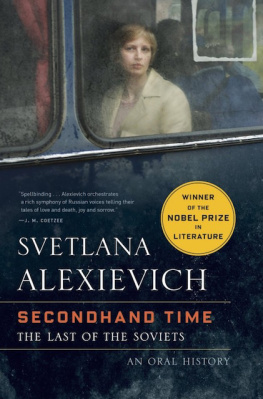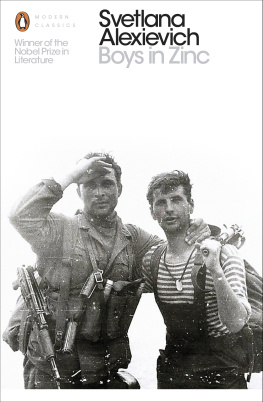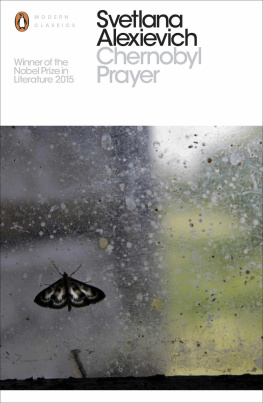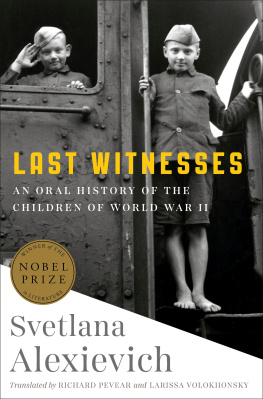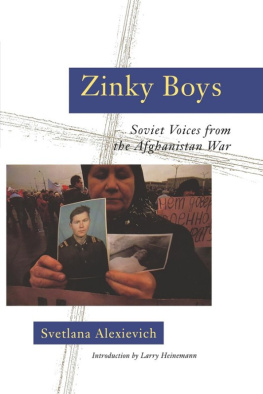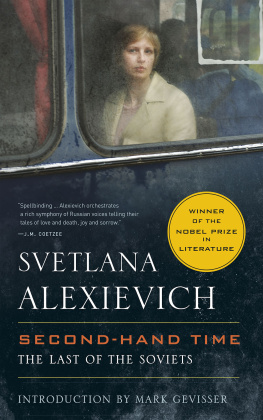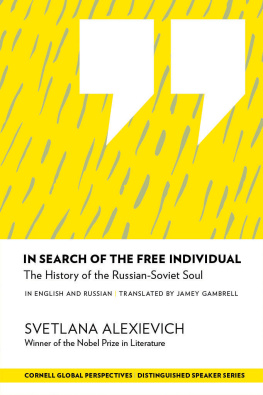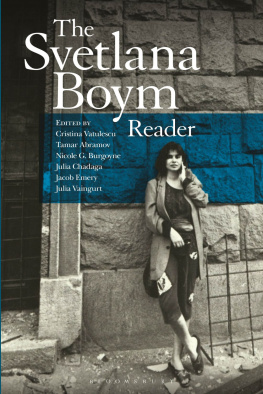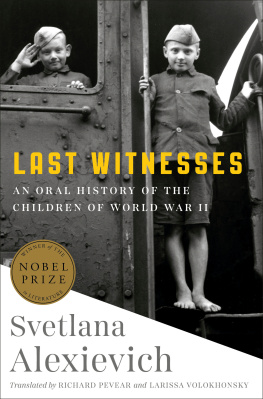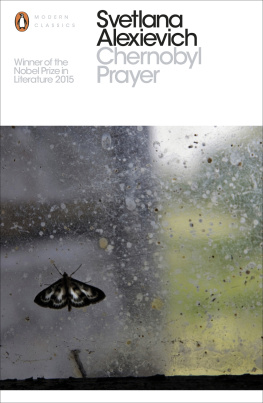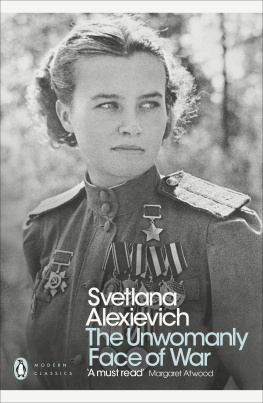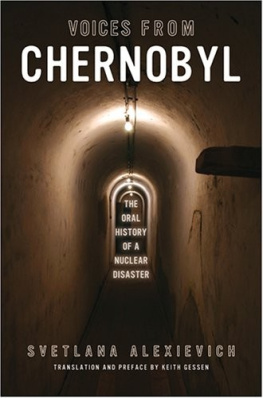Svetlana Alexievich - Secondhand Time. The Last of the Soviets
Here you can read online Svetlana Alexievich - Secondhand Time. The Last of the Soviets full text of the book (entire story) in english for free. Download pdf and epub, get meaning, cover and reviews about this ebook. year: 0, genre: History. Description of the work, (preface) as well as reviews are available. Best literature library LitArk.com created for fans of good reading and offers a wide selection of genres:
Romance novel
Science fiction
Adventure
Detective
Science
History
Home and family
Prose
Art
Politics
Computer
Non-fiction
Religion
Business
Children
Humor
Choose a favorite category and find really read worthwhile books. Enjoy immersion in the world of imagination, feel the emotions of the characters or learn something new for yourself, make an fascinating discovery.
- Book:Secondhand Time. The Last of the Soviets
- Author:
- Genre:
- Year:0
- Rating:3 / 5
- Favourites:Add to favourites
- Your mark:
- 60
- 1
- 2
- 3
- 4
- 5
Secondhand Time. The Last of the Soviets: summary, description and annotation
We offer to read an annotation, description, summary or preface (depends on what the author of the book "Secondhand Time. The Last of the Soviets" wrote himself). If you haven't found the necessary information about the book — write in the comments, we will try to find it.
Svetlana Alexievich: author's other books
Who wrote Secondhand Time. The Last of the Soviets? Find out the surname, the name of the author of the book and a list of all author's works by series.
Secondhand Time. The Last of the Soviets — read online for free the complete book (whole text) full work
Below is the text of the book, divided by pages. System saving the place of the last page read, allows you to conveniently read the book "Secondhand Time. The Last of the Soviets" online for free, without having to search again every time where you left off. Put a bookmark, and you can go to the page where you finished reading at any time.
Font size:
Interval:
Bookmark:
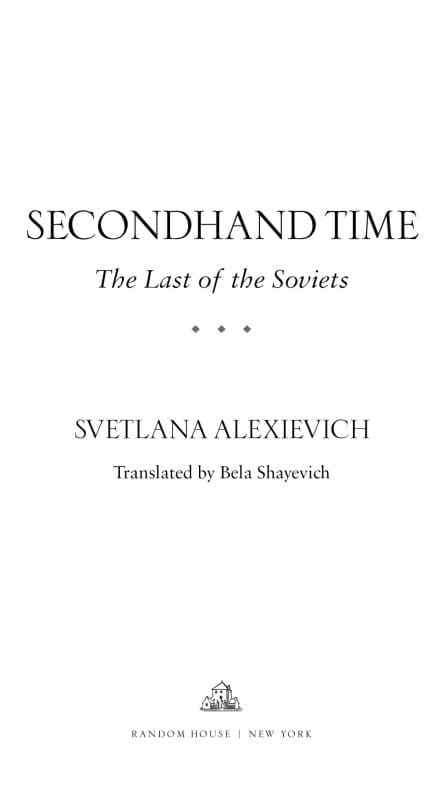

Translation copyright 2016 by Bela Shayevich
All rights reserved.
Published in the United States by Random House, an imprint and division of Penguin Random House LLC, New York.
R ANDOM H OUSE and the H OUSE colophon are registered trademarks of Penguin Random House LLC.
Originally published in Russian as by Vremya Publishing House, Moscow, in 2013. Copyright 2013 by Svetlana Alexievich. This English translation is published in the United Kingdom by Fitzcarraldo Editions, London.
Library of Congress Cataloging-in-Publication Data
Names: Aleksievich, Svetlana.
Title: Secondhand time : the last of the Soviets / Svetlana Alexievich ; translated by Bela Shayevich.
Other titles: Vremia sekond khend. English | Secondhand time
Description: New York : Random House, 2016. | First published in Russian in 2013.
Identifiers: LCCN 2016005925| ISBN 9780399588808 (hardback : acid-free paper) | ISBN 9780399588815 (ebook)
Subjects: LCSH: Post-communismRussia (Federation) | Russia (Federation)Social conditions1991 | Soviet UnionSocial conditions. | Russia (Federation)Biography. | Soviet UnionBiography. | Oral historyRussia (Federation) | Oral historySoviet Union. | BISAC: HISTORY / Europe / Former Soviet Republics. | HISTORY / Europe / Russia & the Former Soviet Union.
Classification: LCC DK510.76 .A44913 2016 | DDC 947.086092/2dc23 LC record available at lccn.loc.gov/2016005925
ebook ISBN9780399588815
randomhousebooks.com
Book design by Mary A. Wirth, adapted for eBook
Cover design: Anna Bauer Carr
Cover photograph: Rory Carnegie/GalleryStock
v4.1_r1
ep
Victim and executioner are equally ignoble; the lesson of the camps is brotherhood in abjection.
DAVID ROUSSET, THE DAYS OF OUR DEATH
In any event, we must remember that its not the blinded wrongdoers who are primarily responsible for the triumph of evil in the world, but the spiritually sighted servants of the good.
FYODOR STEPUN, FOREGONE AND GONE FOREVER


1953: Josef Stalin dies on March 5. On September 14, Nikita Khrushchev becomes First Secretary of the Central Committee of the Communist Party of the Soviet Union (CPSU).
FEBRUARY 1956: Khrushchev delivers a speech to the Twentieth Congress of the CPSU denouncing Stalins cult of personality and the excesses of his policies. Over the next decades, this speech circulates covertly through samizdat and is discussed at closed Party meetings, shocking many. The speech marks the beginning of de-Stalinization and the Khrushchev Thaw, a time of relative liberalization.
NOVEMBER 1956: The Soviet army violently puts down an uprising in Hungary.
NOVEMBER 1957: The Italian publisher Feltrinelli publishes Doctor Zhivago by Boris Pasternak. Under pressure from the Soviet authorities, Pasternak is forced to turn down the Nobel Prize in Literature the following year.
NOVEMBER 1962: One Day in the Life of Ivan Denisovich by Aleksandr Solzhenitsyn is published in Novy Mir, an influential Russian literary magazine. It is the first time that the Soviet labor camps had been written about openly. Nevertheless, a crackdown on dissident groups marks the end of the Thaw.
1964: Khrushchev is removed from power and replaced by Leonid Brezhnev.
1968: The Soviet military invades Czechoslovakia in an attempt to counteract the series of liberalizing reforms known as the Prague Spring reforms, sparking off waves of protests and nonviolent resistance.
19731974: Solzhenitsyns Gulag Archipelago is published in the West in Russian and other languages. In February 1974 Solzhenitsyn is expelled from the Soviet Union.
1975: Thirty-five states, including the USSR and the United States, sign the Helsinki Accords, an attempt to improve relations between the Communist Bloc and the West. The document cites respect for human rights and fundamental freedoms such as freedom of speech.
1979: Soviet troops invade Afghanistan.
NOVEMBER 1982: Brezhnev, the General Secretary of the Communist Party from 1964 to 1982, dies of a heart attack. Yuri Andropov, the head of the KGB, succeeds him.
FEBRUARY 1984: Andropov dies of renal failure. Konstantin Chernenko replaces him.
MARCH 1985: Chernenko dies of emphysema. Mikhail Gorbachev becomes General Secretary of the Communist Party and takes steps toward reform, marking the beginning of perestroika. Novy Mir commences serialization of Doctor Zhivago three years later.
Important reforms undertaken by Gorbachev between 1985 and 1991 under the umbrella of perestroika and glasnost: restitution of land to peasants after sixty years of collectivized agriculture; progressive restoration of political pluralism and freedom of speech, liberation of political prisoners, publication of banned literature; withdrawal of troops from Afghanistan; creation of a new legislative assembly, the Congress of Peoples Deputies. The Congress elects Gorbachev to the presidency of the Soviet Union for five years and institutes constitutional reforms in March 1990. Strategic Arms Reduction Treaty (START I) agreements are signed with the United States in 1991.
FEBRUARY 1986: Boris Yeltsin becomes a member of the Politburo a few months after being named First Secretary of the Moscow City Committee (effectively making him the mayor of Moscow). He is removed from the Politburo in 1988.
APRIL 26, 1986: Reactor No. 4 at the Chernobyl nuclear power plant explodes, leading to serious contamination of Soviet territory.
MARCH 1989: Yeltsin is elected to the Congress of Peoples Deputies.
NOVEMBER 1989: East Berlin permits passage to West Berlin, marking the effective end of the Cold War and the beginning of the reunification of Germany.
DECEMBER 1989: Gorbachev and George H. W. Bush announce the end of the Cold War in Malta.
JUNE 1990: The Congress of Peoples Deputies of the Republic adopts the Declaration of State Sovereignty of the Russian Soviet Federative Socialist Republic (RSFSR), pitting the Soviet Union against the Russian Federation and other constituent republics and signaling the beginning of constitutional reform in Russia.
MAY 1991: Boris Yeltsin is elected president of the RSFSR.
AUGUST 1991: A group of eight high-ranking officials led by Gorbachevs vice president, Gennady Yanayev, form the General Committee on the State Emergency, the GKChP, and stage an attempted coup of the government. It becomes known as the putsch. The GKChP issues an emergency decree suspending all political activity, banning most newspapers, and putting Gorbachev, who is on holiday in Foros, Crimea, under house arrest.
Thousands of protesters come out to stand against the putsch in front of the White House, the Russian Federations parliament building and office of Boris Yeltsin, building barricades to protect their positions. Yeltsin famously addresses the crowd from atop a tank. The Army forces dispatched by the GKChP ultimately refuse to storm the barricades and side with the protesters. After three days, the putsch collapses. Gorbachev returns from Foros, and members of the GKChP are arrested. On August 24, Gorbachev dissolves the Central Committee of the Communist Party of the Soviet Union and resigns as its general secretary.
Font size:
Interval:
Bookmark:
Similar books «Secondhand Time. The Last of the Soviets»
Look at similar books to Secondhand Time. The Last of the Soviets. We have selected literature similar in name and meaning in the hope of providing readers with more options to find new, interesting, not yet read works.
Discussion, reviews of the book Secondhand Time. The Last of the Soviets and just readers' own opinions. Leave your comments, write what you think about the work, its meaning or the main characters. Specify what exactly you liked and what you didn't like, and why you think so.

